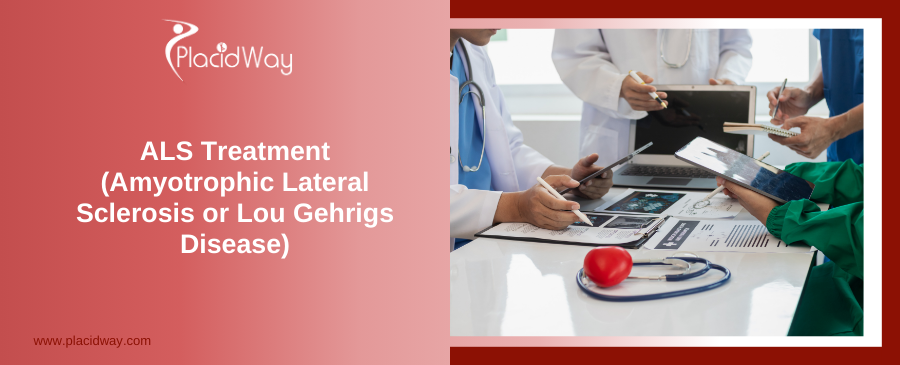
Finding Hope: Advanced ALS Treatment Options & Medical Tourism
Receiving an ALS diagnosis (Amyotrophic Lateral Sclerosis), often known as Lou Gehrig's Disease, can be a life-altering moment, bringing with it immense challenges and the urgent need to explore every possible avenue for care. This progressive neurodegenerative disease attacks the nerve cells that control voluntary muscles, leading to gradual loss of muscle control, paralysis, and ultimately, impacting vital functions like breathing and swallowing. For patients and their families, the journey involves not just managing physical symptoms but also navigating the complex landscape of treatment options, many of which are still in developmental stages or not widely available in every country.
The quest for effective ALS treatment has led many to consider medical tourism. While no definitive cure exists, innovative and investigational therapies, such as certain types of stem cell treatments, are being explored and offered in various clinics around the world. These treatments aim to slow disease progression, alleviate symptoms, and improve the patient's quality of life. For those seeking specialized care, cutting-edge research protocols, or more affordable options than what's available domestically, looking beyond borders for ALS treatment can open doors to new possibilities and renewed hope. This guide aims to provide comprehensive information for individuals considering international options for their ALS care.
What are the common symptoms of ALS (Lou Gehrig's Disease)?
ALS symptoms often begin subtly, making early diagnosis challenging. Patients might first notice weakness in a limb, leading to difficulty with everyday tasks like gripping a pen or tripping while walking. The hallmark of the disease is its progressive nature, meaning symptoms gradually worsen over time. Here are some common indicators to look for, which resonate with common searches like "ALS early symptoms" and "signs of Lou Gehrig's disease":
- Muscle Weakness: This is often the initial symptom, affecting arms, legs, or hands. It can manifest as foot drop, difficulty lifting objects, or problems with fine motor skills.
- Muscle Cramps and Twitching (Fasciculations): Involuntary muscle movements, often visible under the skin, are common.
- Stiffness (Spasticity): Muscles may feel stiff and tight, making movement difficult.
- Difficulty Speaking (Dysarthria): As the muscles controlling speech weaken, words may become slurred, quiet, or difficult to understand.
- Trouble Swallowing (Dysphagia): This can lead to choking, coughing during meals, or weight loss due to inadequate nutrition.
- Breathing Problems: As the disease progresses, muscles used for breathing can weaken, requiring respiratory support.
- Emotional Changes: Some individuals may experience inappropriate laughing or crying (pseudobulbar affect).
It's crucial to remember that these symptoms can also be indicative of other conditions. If you or a loved one are experiencing persistent muscle weakness or other neurological changes, seeking prompt medical evaluation is essential.
What causes ALS and what are its risk factors?
The precise causes of ALS remain a complex area of research, often leading to searches like "causes of ALS" or "is ALS genetic?". While about 5-10% of ALS cases are inherited (familial ALS), the vast majority are considered "sporadic," meaning there's no clear genetic link or family history. Researchers believe a combination of genetic and environmental factors may play a role.
Known and Suspected Risk Factors:
- Heredity: If a close family member has familial ALS, the risk increases. Specific gene mutations like C9orf72, SOD1, TARDBP, and FUS are associated with familial ALS.
- Age: The risk of ALS increases with age, most commonly developing between 40 and 70.
- Sex: Men are slightly more likely to develop ALS than women, though this difference diminishes with age.
- Environmental Factors: While not definitively proven, research continues to explore potential links between ALS and:
- Smoking: Some studies suggest a link, particularly for women.
- Exposure to Toxins: Lead, pesticides, and certain industrial chemicals have been investigated, but results are often inconclusive.
- Military Service: Veterans appear to have a higher risk of ALS, though the specific reason is unclear and could be related to various environmental exposures during service.
The interaction between these factors is still being uncovered, emphasizing the need for ongoing research to understand and ultimately prevent this devastating disease.
What types of treatments are available for ALS patients?
While there is no cure for ALS, a range of treatments are available, focusing on managing symptoms, slowing disease progression, and improving quality of life. The search for "ALS treatment options" or "new treatments for Lou Gehrig's" often highlights various approaches:
- FDA-Approved Medications:
- Riluzole (Rilutek, Exservan, Tiglutik): The first FDA-approved drug for ALS, believed to reduce damage to motor neurons. It can extend survival by a few months.
- Edaravone (Radicava, Radicava ORS): Approved in 2017, this antioxidant is thought to reduce oxidative stress, which may play a role in motor neuron degeneration. It can slow the decline in daily function.
- Sodium Phenylbutyrate and Ursodoxicoltaurine (Relyvrio): Approved in 2022, this oral medication aims to reduce neuronal cell death by addressing mitochondrial dysfunction and endoplasmic reticulum stress.
- Symptomatic Therapies: These are crucial for managing the day-to-day challenges of ALS:
- Physical Therapy: Helps maintain muscle strength and mobility, prevents stiffness, and provides assistive devices.
- Occupational Therapy: Assists with adapting to daily activities, providing adaptive equipment for eating, dressing, and hygiene.
- Speech Therapy: Helps maintain communication abilities and addresses swallowing difficulties.
- Nutritional Support: Manages dysphagia and ensures adequate caloric intake, often involving feeding tubes as needed.
- Respiratory Support: Ventilators or non-invasive breathing assistance (e.g., BiPAP) become necessary as breathing muscles weaken.
- Investigational and Advanced Therapies (Often Abroad):
- Stem Cell Therapy for ALS: This is a key area of medical tourism. Various types of stem cells (e.g., mesenchymal stem cells - MSCs) are used, often administered intravenously or intrathecally, with the goal of reducing inflammation, promoting nerve repair, and supporting existing motor neurons. Clinics abroad may offer protocols not yet widely available or approved in all countries.
- Gene Therapy: Early-stage research is exploring modifying genes to counteract the effects of specific genetic mutations in familial ALS.
- Clinical Trials: Patients can also participate in clinical trials for new drugs and therapies, which might be available in specialized centers globally.
The choice of treatment depends on the individual's stage of the disease, specific symptoms, and personal preferences, often involving a multidisciplinary team approach.
Who is eligible for advanced ALS treatments abroad?
When considering "ALS treatment eligibility" for advanced therapies, especially those like stem cell therapy offered internationally, criteria can vary significantly from one clinic or country to another. It's not a one-size-fits-all scenario, and rigorous evaluation is always required.
Common eligibility considerations often include:
- ALS Diagnosis Confirmation: Patients must have a confirmed diagnosis of ALS, typically based on established criteria (e.g., El Escorial criteria).
- Disease Stage: Many clinics prefer patients in the early to moderate stages of ALS. This is because therapies may be more effective when there are still viable motor neurons to protect or support. Patients with very advanced disease, significant respiratory compromise, or profound weakness might not be ideal candidates due to the potential risks of travel and the procedure itself.
- Overall Health Status: Beyond ALS, patients should generally be in stable health. Co-existing conditions (e.g., severe heart disease, kidney failure, active infections, or certain cancers) might preclude eligibility due to increased procedural risks.
- Age: While there isn't always a strict age cut-off, very elderly patients might face higher risks from procedures and travel.
- Specific Protocol Requirements: Different stem cell protocols or investigational therapies may have their own unique inclusion and exclusion criteria based on the type of cells used, administration method, and safety considerations.
- Ability to Travel: Patients must be medically stable enough to endure international travel and the treatment process.
The best way to determine eligibility is to provide your comprehensive medical records to the international clinic for a thorough review by their medical team. This often involves detailed reports, MRI scans, nerve conduction studies, and electromyography results.
What is the typical recovery time and what can I expect after ALS treatment?
It's crucial to manage expectations when discussing "recovery time" for ALS. As a progressive neurodegenerative disease, ALS currently has no cure that reverses the damage. Therefore, "recovery" in the traditional sense of regaining lost function completely is not the primary outcome. Instead, treatments for ALS, especially advanced therapies like stem cell treatment, aim to:
- Slow Down Disease Progression: The hope is to extend the time before symptoms worsen significantly.
- Alleviate Symptoms: Reduce the severity of muscle cramps, spasticity, or fatigue.
- Improve Quality of Life: Enhance daily functioning and comfort.
- Stabilize Function: Maintain existing abilities for longer periods.
What to Expect After Treatment:
- No Immediate Dramatic Changes: Unlike some acute medical procedures, ALS treatments, particularly stem cell therapies, do not typically result in immediate, dramatic improvements. Any potential benefits are usually gradual and subtle, unfolding over weeks or even months.
- Individual Variability: Patient responses vary widely. Some might experience a stabilization of their condition, while others might notice slight improvements in certain functions (e.g., strength in a limb, ease of swallowing), and some may not experience noticeable benefits.
- Ongoing Supportive Care: Regardless of advanced treatments, continued physical therapy, occupational therapy, speech therapy, and nutritional support are essential components of post-treatment care.
- Follow-up and Monitoring: Regular follow-up with neurologists, both locally and potentially with the international clinic, is vital to monitor progress and adjust symptomatic management.
- Realistic Outlook: It's vital for patients and families to have a realistic understanding that even the most advanced therapies are generally considered disease-modifying or symptomatic, not curative.
Open communication with the medical team, both before and after treatment, is key to setting appropriate expectations for "life after ALS treatment" and understanding potential outcomes.
What are the risks and potential side effects of ALS treatments?
Like any medical intervention, ALS treatments come with potential risks and side effects. These can vary significantly depending on whether the treatment is an FDA-approved medication, symptomatic management, or an investigational therapy like stem cell treatment. Understanding these "ALS treatment risks" is critical for informed decision-making.
Risks of Approved Medications:
- Riluzole: Common side effects include nausea, weakness, dizziness, and liver function abnormalities (requiring monitoring).
- Edaravone: Can cause headache, bruising, gait disturbance, and hypersensitivity reactions.
- Relyvrio: Common side effects include diarrhea, abdominal pain, nausea, and upper respiratory tract infection.
Risks of Symptomatic Therapies:
- Physical/Occupational Therapy: Generally low risk, but can involve muscle soreness or minor injuries if exercises are not performed correctly.
- Respiratory Support (Ventilators): Risks include infection, discomfort, and dependence.
- Feeding Tubes: Risks include infection at the insertion site, leakage, or complications during placement.
Risks of Investigational Therapies (e.g., Stem Cell Therapy, particularly abroad):
- Infection: Any invasive procedure carries a risk of infection.
- Immune Reaction/Rejection: Though less common with autologous (patient's own) cells, using allogeneic (donor) cells can carry a risk of immune response.
- Tumor Formation (Teratomas): A rare but serious concern, particularly if undifferentiated pluripotent stem cells are used. Reputable clinics use adult mesenchymal stem cells, which have a lower risk.
- Procedure-Specific Risks: Risks related to the method of administration (e.g., spinal tap for intrathecal injection, intravenous infusion).
- Unproven Efficacy: Many stem cell treatments for ALS abroad are considered experimental, with limited long-term safety and efficacy data from rigorous clinical trials.
- Ethical Concerns and Financial Exploitation: Patients seeking "stem cell therapy side effects" online often encounter clinics making exaggerated claims, operating with minimal oversight, and charging exorbitant fees for unproven treatments.
- Travel-Related Risks: For patients with advanced ALS, long-distance travel can pose additional health risks.
It is paramount to thoroughly research any clinic and treatment protocol, ensure the medical team is board-certified, and understand all potential risks before embarking on an international medical journey for ALS.
How do ALS treatment costs compare worldwide?
The "cost of ALS treatment abroad" is a major consideration for many patients, as advanced or investigational therapies can be very expensive and often not covered by standard insurance policies in their home countries. The price can fluctuate dramatically based on the country, the clinic's reputation, the specific treatment protocol (e.g., type and number of stem cell infusions), and the duration of stay.
For FDA-approved drugs like Riluzole, Edaravone, or Relyvrio, costs are typically managed through national healthcare systems or private insurance in the patient's home country, though out-of-pocket expenses can still be substantial. However, for procedures like stem cell therapy, the price points are entirely different.
| Country / Region | Estimated Cost Range (Stem Cell Therapy for ALS) | Notes |
|---|---|---|
| USA | $50,000 - $150,000+ | High costs; experimental treatments often not covered by insurance. Primarily clinical trials or private pay. |
| Western Europe (e.g., Germany) | €20,000 - €70,000 | Regulated environment, but still considered experimental for ALS; costs can be substantial. |
| India | $7,000 - $25,000 | Significantly lower costs; growing medical tourism hub, but regulation varies; due diligence crucial. |
| Mexico | $10,000 - $35,000 | Accessible from North America; diverse range of clinics, varying levels of oversight. |
| China / Southeast Asia (e.g., Thailand) | $15,000 - $40,000 | Competitive pricing; varying regulations and standards; comprehensive research needed. |
These are approximate ranges for stem cell therapy and can exclude initial consultations, diagnostics, post-treatment care, travel, and accommodation. Always request a detailed, all-inclusive quote from any clinic you consider. "Affordable ALS therapy" often comes with the caveat of needing to thoroughly vet the provider.
Why should I consider traveling abroad for ALS treatment?
For many facing an ALS diagnosis, the decision to embark on "medical tourism for ALS" is driven by several compelling factors:
- Access to Novel and Investigational Therapies: Perhaps the most significant reason. Many countries offer advanced or experimental treatments, particularly various forms of stem cell therapy, that may not yet be approved or widely available in a patient's home country. These protocols might offer different approaches or a broader range of options.
- Cost Savings: As seen in the cost comparison, the price of advanced medical procedures, especially experimental ones, can be substantially lower in certain countries compared to the USA or Western Europe, making treatment more financially accessible.
- Shorter Wait Times: In some national healthcare systems, lengthy wait lists for specialized consultations or treatments can be a major barrier. International clinics often provide quicker access to appointments and procedures.
- Comprehensive Care Packages: Many medical tourism providers offer all-inclusive packages that cover treatment, accommodation, airport transfers, and even translation services, simplifying the logistical challenges of international travel.
- Advanced Facilities and Expertise: Certain international medical centers specialize in neurological disorders and have invested heavily in state-of-the-art technology and highly skilled medical professionals, sometimes even attracting leading researchers.
- Integrated and Holistic Approaches: Some clinics abroad offer a more holistic approach, combining conventional treatments with complementary therapies, nutritional support, and intense rehabilitation programs, all in one setting.
While the decision to seek "ALS treatment overseas" is deeply personal, these factors highlight why medical tourism has become a beacon of hope for many patients and their families worldwide.
Which countries offer advanced or alternative ALS treatment options?
The landscape of "best countries for ALS treatment" for advanced or alternative therapies is dynamic, with various nations emerging as popular destinations for medical tourists seeking options beyond their borders. These countries often have specialized clinics and research centers that offer treatments like stem cell therapy for ALS.
Leading destinations include:
- India: Known for its affordable healthcare and skilled medical professionals, India has several clinics offering stem cell therapy for neurological conditions, including ALS. They often provide comprehensive packages at a fraction of Western costs.
- Mexico: Due to its proximity to the United States and Canada, Mexico is a frequent choice. Clinics here offer a range of stem cell protocols, often with shorter waiting times and competitive pricing.
- Germany: Renowned for its stringent medical regulations and advanced research, Germany also hosts clinics offering innovative therapies. While generally more expensive than Asian or Latin American options, they often adhere to high European medical standards.
- Thailand: A growing hub for medical tourism, Thailand combines high-quality medical facilities with excellent hospitality services. Some centers offer stem cell treatments and integrated rehabilitation programs.
- China: Historically, China has been at the forefront of stem cell research and application, with numerous centers offering various protocols. However, regulatory oversight and transparency can vary, requiring careful due diligence.
- Turkey: With modern hospitals and an increasing focus on medical tourism, Turkey offers competitive pricing for various medical procedures, including some advanced neurological treatments.
When choosing a country and clinic, always prioritize those with international accreditation (like JCI), transparent communication, and physicians with recognized credentials in neurology and regenerative medicine.
How to ensure safety and quality when seeking ALS care abroad?
The pursuit of "safe ALS treatment abroad" is paramount. While medical tourism offers hope, it also carries potential risks if not approached carefully. Ensuring safety and quality requires diligent research and adherence to best practices. Here's how to navigate the process:
- Verify Accreditation: Look for international accreditations such as Joint Commission International (JCI). This signifies that a facility meets rigorous international standards for patient safety and quality of care. Other local or national accreditations are also important.
- Research Physician Credentials: Ensure the doctors and specialists treating you are board-certified and have extensive experience in neurology and the specific advanced therapy they are offering for ALS. Check their educational background, publications, and professional affiliations.
- Demand Transparency: A reputable clinic will provide clear, detailed information about the treatment protocol, potential benefits, known risks, and a complete breakdown of costs (no hidden fees). Be wary of clinics that make exaggerated claims or guarantee a "cure."
- Seek Patient Testimonials and Reviews: While anecdotal, patient experiences can provide valuable insights. Look for genuine reviews, not just generic endorsements. Websites like PlacidWay often compile patient stories and reviews.
- Understand the Aftercare Plan: A quality clinic will provide a clear post-treatment follow-up plan, including recommendations for ongoing care, medication, and rehabilitation, which you can share with your local neurologist.
- Communication and Language Support: Ensure there are clear communication channels and that language barriers will not impede your care or understanding of your condition. Many medical tourism providers offer translation services.
- Consult Your Home Doctor: Discuss your plans with your primary care physician or neurologist at home. They can help you evaluate the proposed treatment and manage your health before and after travel.
- Utilize Medical Tourism Platforms: Reputable platforms like PlacidWay specialize in connecting patients with vetted international clinics. They can assist with information gathering, clinic comparisons, and logistical arrangements, helping to filter out less credible options.
By taking these steps, you can significantly enhance your chances of finding "medical tourism safety tips" and a high-quality, safe ALS treatment experience abroad.
What are patient success stories from abroad for ALS?
While medical science for ALS treatment is still evolving, many patients who have traveled abroad for advanced therapies, especially stem cell treatments, share stories that offer a glimpse of hope and improved quality of life. It's important to frame "patient success stories" in the context of ALS being a progressive disease, where "success" often means slowing progression or significant symptom management rather than a complete cure.
Common themes in patient testimonials often include:
- Stabilization of Symptoms: Many patients report a halt or significant slowing of disease progression, meaning their condition doesn't worsen as rapidly as expected. This can translate to maintaining current abilities for a longer period.
- Improved Quality of Life: Even subtle changes can have a profound impact. Patients sometimes share experiences of reduced muscle cramps and spasticity, better sleep quality, increased energy levels, or improved appetite.
- Small Functional Gains: Some individuals have reported minor improvements in specific functions, such as slightly better strength in a limb, easier breathing, or clearer speech, even if these are not dramatic or long-lasting.
- Enhanced Well-being: Beyond physical changes, many patients describe an improved sense of well-being, reduced anxiety, and a feeling of empowerment from actively pursuing treatment options.
- Access to Care: A "success story" also includes the ability to access treatments that were unavailable in their home country, providing psychological relief and renewed hope.
These stories, while encouraging, are individual experiences and should be considered alongside scientific evidence and professional medical advice. They underscore the potential of these therapies to positively impact the challenging journey of living with ALS, emphasizing that hope can be found in various forms.
Take the Next Step with PlacidWay
Ready to explore treatment options abroad? Discover top clinics, compare prices, and get a free quote tailored to your needs with PlacidWay.
Best Neurology Treatment Center | Cheap Neurology Treatment Packages










Share this listing